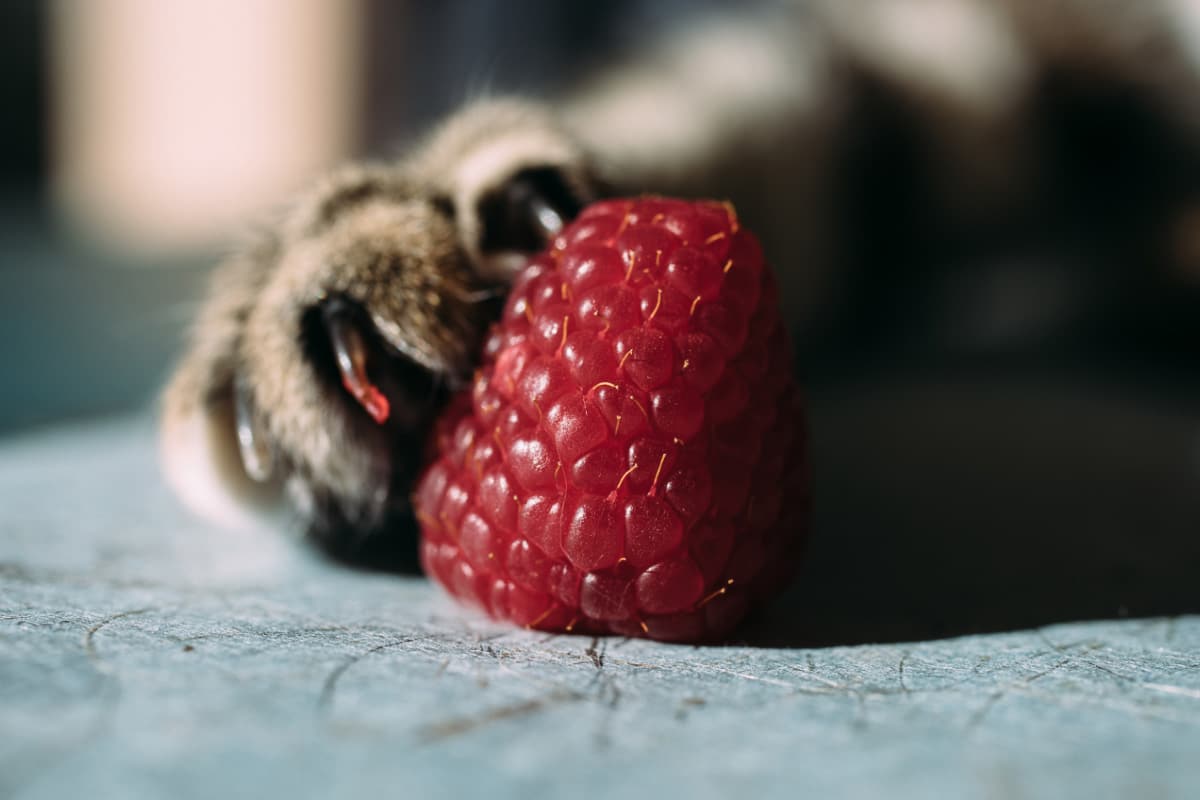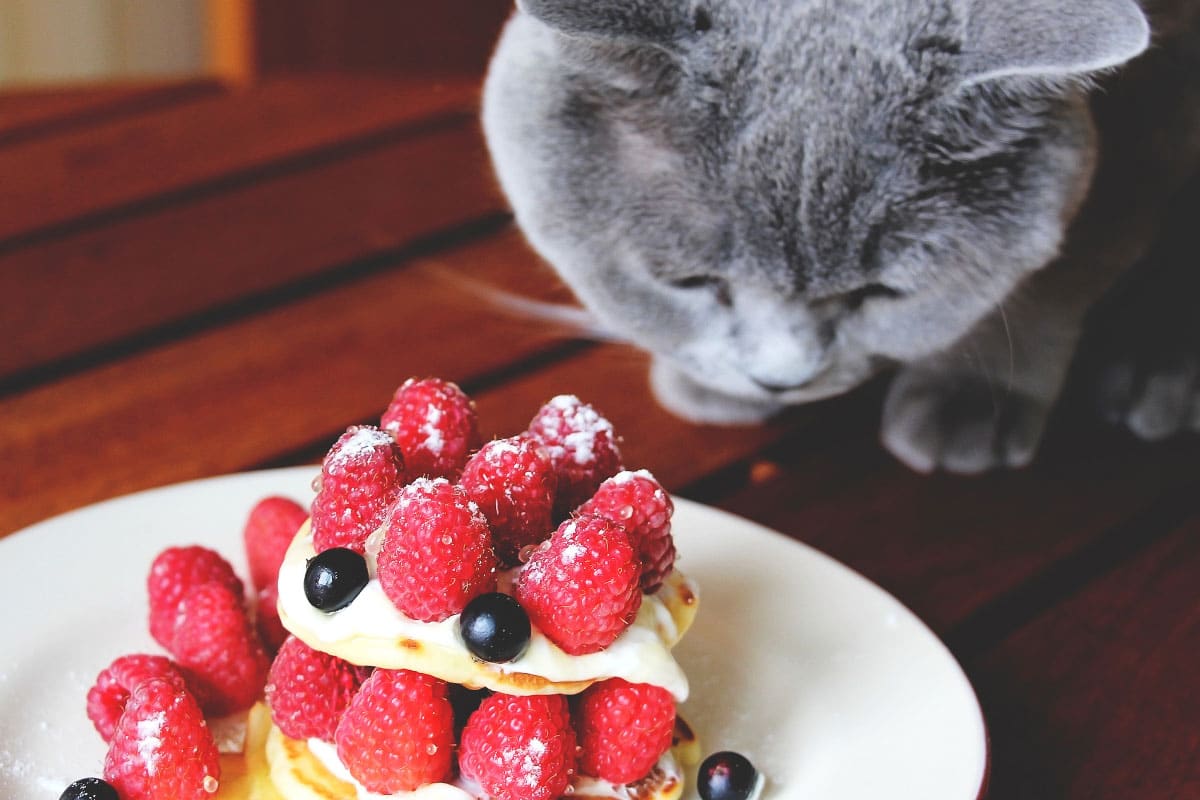Who doesn’t love rewarding a curious cat with a treat? There you are indulging in your favorite snack or fruit. Suddenly a hairy face bobs up, clearly wanting a closer look at that exciting tidbit in your bowl.
The twitching nose and the stretching neck are so adorable. Cats have a keen sense of smell and love to investigate enticing aromas.
But can you give him a sample? It depends on what it is. Some foods are toxic to cats. Others may not be toxic but still aren’t suitable for them. While others still are great and perfectly safe for them.
Raspberries fall somewhere along with the midway point of that scale. Can cats eat raspberries? Let’s take a closer look at this tasty fruit and whether the cat can indulge in its sweet, aromatic goodness.

Contents
Can Cats Eat Raspberries?
Benefits of Raspberries (For Humans)
Raspberries are really nutritious. They are high in fiber and vitamins and are relatively low in harmful sugars. It’s often recommended for people living with diabetes or insulin resistance, and it is said to even combat cancer due to its high concentration of antioxidants.

People with high blood pressure can benefit from a regular serving of raspberries. And, of course, raspberries are tasty! Here’s a brief list of some of the fantastic nutritional components of raspberries:
- Calcium
- Dietary fiber
- Magnesium
- Manganese
- Potassium
- Vitamin A, C, and K
Raspberries also contain high levels of fiber – one cup can contain up to 8 grams of dietary fiber. They contain the two types of fiber: insoluble and and soluble. Insoluble fiber is what creates a feeling of fullness from food. It is also very helpful to our digestive systems. As fiber isn’t digestible it helps to break up any bulk in your stools which allows food to pass your your system more easily.
The soluble fiber attracts water during digestion and turns to a kind of gel. This tends to slow the digestive process and stops sugary and fatty foods from being absorbed as quickly into the bloodstream. Together, the combination of these two types of fiber is good for the health of your gut.
So, Can My Cat Eat Raspberries
So, the short answer to this question is yes. They won’t have to be rushed to the vet immediately if they sneak a single berry from your plate. But this doesn’t mean you should feed your cat raspberries. This is why we have a longer answer.
Raspberries Aren’t an Ideal Food For Cats
Cats are primarily carnivorous. They acquire most of their necessary nutrition through meat or high-protein cat food. They are engineered to hunt – and this instinct is probably the reason you’ve found a lifeless rodent or lizard carcass or two around your house from time to time. Everything in a cat’s metabolism, anatomy and physiology points to a strictly carnivorous diet for cats.
Indeed, cats have a higher protein requirement than most other animals and they don’t have the digestive enzymes necessary to receive the benefits of plant sourced Vitamin A.

Fruits and vegetables aren’t on a cat’s regular menu. Sure, sometimes they seem to be looking for a break from their traditional dry food. But you should keep an eye on this since some foods and common houseplants can even poison them.
Raspberries do not contain anything specifically toxic to cats. But it does have a tiny amount of Xylitol (see below for more info on Xylitol). Consumed in large amounts, this could make your cat sick. (Read on for more information.)
However, one or two raspberries should be a small enough amount not to be a problem from time to time. In fact, the antioxidant component of the raspberry may be useful for older, rheumatic, or arthritic cats. But, if in doubt, ask your vet.

Cats Cannot Eat Raspberries in Bulk
There is a danger if your cat consumes more than one or two raspberries at any given time. As I mentioned above, cats are primarily carnivores. They don’t have the digestive development requirement to handle fruit, vegetables, and plants properly.
As a result, a large number of raspberries may throw your cat’s tummy into all kinds of disarray. It may result in diarrhea or vomiting. All of which will be very distressing and may lead to further complications with other underlying conditions.
How do I serve my cat raspberries?
If you are tempted to serve your cat raspberries make sure it is a very very small amount such as two raspberries. Don’t leave the raspberries lying around anywhere within reach of your cat. Raspberries have a shape and size that is attractive to cats and the smell can also be very appealing.
Or you could serve your cat a small scoop of raspberry yoghurt. Cats don’t generally enjoy sweet foods so will normally prefer natural or plain yoghurt to any that is flavoured. However, if your cat loves raspberry yoghurt you can give them a small scoop of it safely.
Do not feed your cat raspberry jam – the high sugar levels can destabilize your cat’s blood sugar levels. And don’t feed your cat raspberry ice cream. Ice cream contains sugars and artificial flavours that aren’t good for your cats system plus of course lactose from the milk in the product. Cats are highly intolerant to lactose and it can cause them numerous health problems including pain, vomiting, diarrrhea and more.

What About Frozen Raspberries?
The same rules apply, whether they be fresh or frozen raspberries. A word of caution, though:
Some people enjoy a sprinkling of sugar over frozen berries. Do not feed your cat anything with added sugar. At best, your cat may become chubby. At worst, it could develop diabetes over time.
A Word on Xylitol
Xylitol is a natural alcoholic substance often sold as a substitute for sugar. It is dangerous for some pets, and it’s directly poisonous to dogs and cats in large amounts. And while we’re on the topic, all alcohol is dangerous for pets.

Raspberries contain xylitol in small amounts. That’s why it’s not a good idea to let your cat eat raspberries in large quantities. Experts agree that one or two raspberries per week is a very safe amount to offer your cat.
What to Do If Your Cat Eats Too Many Raspberries
If you suspect your cat may have been at the raspberries when you stepped out of the room, you may need to take some quick action. First, here’s what to look out for and some of the side effects you may observe:
- Dehydration
- Diarrhea
- Odd-smelling, pungent feces
- Vomiting
If the symptoms seem moderately severe, a visit to the vet is recommended. It would also be best to try to ascertain how much the cat may have eaten. A severe case of bad eating could result in kidney damage.

Cats and Other Fruit
Not all fruits are equal when it comes to the level of harm or suitability for pets. Cats (snd dogs) tend to do better with some fruits than with others.
Apples, bananas, and watermelon, for example, can be treated in the same way as raspberries. A little piece here and there should be fine.
But under no circumstances should you feed grapes or raisins to your cat. Cherries contain cyanide, which can kill pets. Citrus plants and some fruits contain citric acids, which do not agree with your beloved animals. And for safety’s sake, avoid green tomatoes.

Lately, several pet foods with elements of fruit flavors have also emerged on the market. Using these is a matter of preference. But again, if you’re unsure, talk to your vet or behaviorist.
Final Thoughts on Cats and Raspberries
There’s no fundamental reason you can’t enjoy a bonding moment with your cat over a raspberry or two from time to time. Your cat may love the taste and smell of it. Some cats, of course, won’t care for it at all.
But it’s also good advice not to have raspberries lying around where your cat can access them freely. The dangers of too many are known and avoidable.

But let the cat try one. You may have discovered a new, special treat in the bright, sweet fruit.

